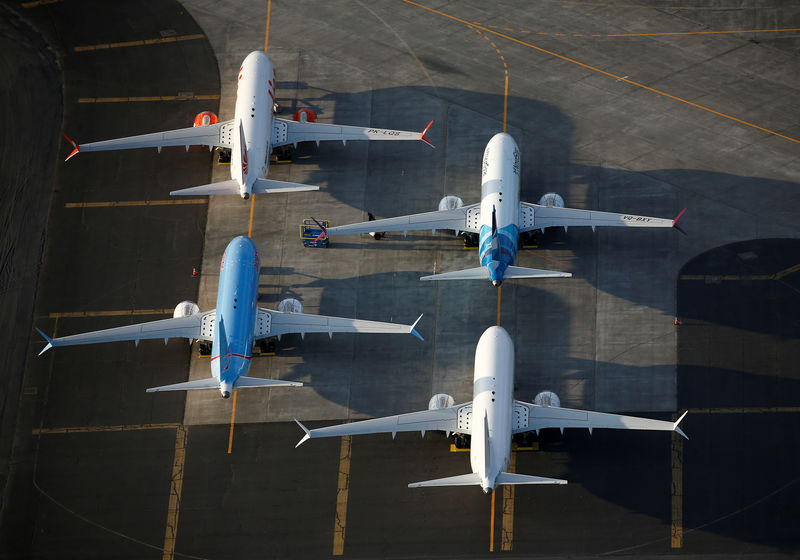By David Shepardson and Laurence Frost
WASHINGTON/PARIS (Reuters) - U.S. and European regulators have asked Boeing Co (N:BA) to revise documentation on its proposed 737 MAX software fix, the planemaker confirmed Wednesday, further complicating its efforts to return the jet to service by year-end.
The world's largest planemaker had submitted documentation in a key part of an approval process, already delayed by months, for a 737 MAX software upgrade in the wake of two crashes in Ethiopia and Indonesia that killed 346 people.
U.S. Federal Aviation Administration (FAA) and European Union Aviation Safety Agency (EASA) officials flagged a number of issues over the weekend at an Rockwell Collins (NYSE:COL) facility in Cedar Rapids, Iowa, during a documentation audit of how the new software was developed, sources told Reuters.
Boeing and regulators will return to Iowa at a yet-to-be-determined date to complete the audit, the officials said.
"We think there is still some work to be done," EASA Executive Director Patrick Ky told Reuters on Monday.
Boeing spokesman Gordon Johndroe said Wednesday the company "provided technical documentation to the regulators as part of the software validation process. The documentation was complete, and it was provided in a format consistent with past submissions. Regulators have requested that the information be conveyed in a different form, and the documentation is being revised accordingly."
One person briefed on the matter characterized the issue differently and said Boeing's paperwork had gaps, was substandard and meant regulators could not complete the audit, a crucial step before the plane can be certified to return to service.
The person said it could take "weeks" to satisfy regulators in a worst-case scenario, though Boeing believes it can address the omissions in a matter of days.
The extent of the delays caused by the documentation requirements was not immediately clear. There was no indication of any need to revise the software package based on the audit, sources said.
Boeing is ramping up the number of people assigned to address the software documentation officials, a source said. Boeing shares closed down about 1%.
Boeing chief financial officer Gregory Smith said at an industry conference on Wednesday that the company's job is "make sure we get everything done right on time, answer every question, every document that's needed, every form of software enhancement that's required anytime."
The FAA declined to comment on the audit but said it was "following a thorough process, not a prescribed timeline, for returning the Boeing 737 Max to passenger service."
In September, FAA Administrator Steve Dickson said the agency had told Boeing "it's really better to be very methodical and very detailed rather than try to rush a partially completed product and then say, ‘We’ll get back to you with the rest of it.’"
Dickson said the FAA will need 30 days from the time of the as-yet unscheduled certification test flight before it can unground the plane.
A third person, familiar with FAA documentation audits but who did not participate in the 737 MAX review over the weekend, said such audits frequently uncover inconsistencies or omissions in documentation but rarely lead to changes to the underlying software or system.
Boeing's fastest-selling jetliner has been grounded worldwide since March, cutting off a key source of cash for Boeing while forcing airlines to cancel thousands of flights. Many carriers have taken the MAX off schedules into 2020.
American Airlines Group (O:AAL) Chief Executive Doug Parker told a conference on Wednesday that American's plan to put some of its 737 MAX jets back in the air in mid-January https://www.reuters.com/article/us-ethiopia-airplane/american-airlines-cancels-737-max-flights-until-jan-16-idUSKBN1WO1FX would require FAA approval in "the earlier part of December."
Boeing has repeatedly delayed its timeline for returning the plane to flight by the end of 2019, as regulators have scrutinized proposed fixes.

Documentation requirements are central to certification for increasingly complex aircraft software, and can become a source of delays. In 2008, EASA nearly derailed Europe's Airbus A400M https://www.reuters.com/article/us-air-a400m-idUSTRE6570NK20100608 military transporter over software documentation following a failed audit.